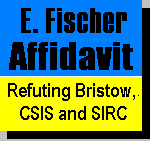 The
Heritage Front Affair
The
Heritage Front AffairA report to the Solicitor General of Canada
 The
Heritage Front Affair
The
Heritage Front Affair
"The Service has also learned from a reliable source that Howard
Goldenthal, a 'Fifth Estate' researcher, recently contacted Heritage Front
leader Wolfgang Droege, in an effort to determine whether the Canadian
soldiers involved in the recent deaths of Somalis were linked to any racist
group in Canada. Droege stated that none of the military people he knew
were in Somalia.
Goldenthal was persistent in his attempts to obtain from Droege the names
of individuals involved in the white supremacist movement and to determine
the existence of a Ku Klux Klan (KKK) cell in the Petawawa area. Our source
stated that Droege reluctantly identified [one individual] as the leader
of a small Klan cell near Petawawa. He also stated that the individual
was affiliated with a QuÈbec group linked to the 'Invisible Empire
Knights of the KKK', in North Carolina, led by James Farrands.
The source also stated that Droege agreed to be interviewed by Goldenthal
for the CBC television but told source he would be vague about the involvement
of military personnel in the Heritage Front as he could not damage careers
by exposing individuals to the media. Although Droege has claimed privately
to colleagues that there are members of the military in the Heritage Front,
the Service has no information to corroborate this. The Service has no
date for the airing of the interview."
The Review Committee carefully investigated the "Toronto Star"
allegations. Our inquiries sought to answer the following questions:
Did CSIS spy on the CBC? How did CSIS learn about the Fifth Estate story?
Can CSIS collect and provide the Minister with this kind of information?
We reviewed CSIS material and found that the Service did not investigate
the CBC, "The Fifth Estate", its journalists or other
employees. CSIS learned about "The Fifth Estate" story
in the course of the lawful investigation of a white supremacist target.
CSIS incidentally learned about the CBC's story through a lawful authorized
investigation of white supremacists. The information was not obtained from
a human source. We concluded that the information was lawfully obtained.
 CSIS
compiled a chronology of events for the period 1989 - 1993. The chronology
indicates that CSIS was aware of the probable presence of white supremacists
in the Canadian Armed Forces as early as July 1989. The Service was in
contact a number of times with the Department of National Defence in relation
to information on the issue which the two agencies had collected. Some
discussions took place in Alberta in March 1992 and at Canadian Forces
Base, Downsview in June 1992, and involved one case of a soldier who was
sent to Somalia. He was not charged in relation to the death of a Somali
teenager. None of those charged or convicted in the death were linked to
the Heritage Front.
CSIS
compiled a chronology of events for the period 1989 - 1993. The chronology
indicates that CSIS was aware of the probable presence of white supremacists
in the Canadian Armed Forces as early as July 1989. The Service was in
contact a number of times with the Department of National Defence in relation
to information on the issue which the two agencies had collected. Some
discussions took place in Alberta in March 1992 and at Canadian Forces
Base, Downsview in June 1992, and involved one case of a soldier who was
sent to Somalia. He was not charged in relation to the death of a Somali
teenager. None of those charged or convicted in the death were linked to
the Heritage Front.
The Committee learned that, circa September 1992 Eric Fischer, a member
of both the Heritage Front and the Church of the Creator, was actively
recruiting within the military for the COTC. The Service's investigations
against the white supremacist leadership in Canada revealed "that
leading racists believe that the military is a good recruiting ground."
The Service's investigations have uncovered "general information pertaining
to racists in the military. Most of this information relates to individuals
in contact with CSIS targets who claim to be past or present members of
the military.
Section 12 of the CSIS Act defines CSIS' primary mandate - its authority
to collect, retain and report security intelligence information:
s. 12 "The Service shall collect, by investigation
or otherwise, to the extent that it is strictly necessary, and analyze
and retain information and intelligence respecting activities that may
on reasonable grounds be suspected of constituting threats to the security
of Canada and, in relation thereto, shall report to and advise the Government
of Canada."
The key question is: can CSIS collect and retain such information? In
other words: was that information "strictly necessary"
to the successful prosecution of the investigation against a lawful target?
If the information was "strictly necessary" to the investigation,
then it is clearly legal to pass that information to the Minister.
s.12 "... shall report to and advise the
Government of Canada."
The Review Committee does not believe that CSIS should be able to collect
and retain information absolutely legally, but then decide that pertinent
information should be kept from the Government. Such a practice could lead
to a lack of accountability and would be contrary to the major thrust of
the McDonald Commission: political control and accountability.
On the other hand, if it was not "strictly necessary"
to collect the information, it should have been destroyed and could not,
therefore, have been passed to the Minister.
Clearly, when technical and human sources are directed at a lawful target,
a great deal of information is collected. Much of it would not normally
meet the "strictly necessary" test, but the Review Committee
does not believe that it would be practical to try to ensure that every
single piece of information passed the test. However, when information
is received which touches upon "sensitive institutions":
solicitor/client, the universities, political parties, or the media, for
example, the "strictly necessary" test should be met.
The Service said that the former Solicitor General
"stated a preference that when CSIS had material in its possession
related to its mandate that affected the topical issues of the day that
he wished to be briefed on this material through the Housebook Card system."
As a Minister, the Service pointed out, the Solicitor General "adopted
the system noted above. The Service, however, was careful to limit its
briefings to its legitimately mandated activities."
The purpose of this Housebook Card, said CSIS, "was to brief the
Minister on any possible relationship that may exist between members of
the Heritage Front and the Canadian Armed Forces."
CSIS pointed out that the second page of the briefing note deals "almost
exclusively with information that the Service had on the subject of racism
and relationships that the Heritage Front membership had with the Canadian
Armed Forces."
In this case, the only "security intelligence" information
obtained from the CBC's contacts with Wolfgang Droege was about the presence
of white supremacists in the military. At the time, the Government and
CSIS were already aware of the problem, and so the information was not
new. The Service believes that it bore the onus to put the information
in a proper context.
The Review Committee believes that the portion of the information that
related directly to the possible television program did not meet the "strictly
necessary" test and, therefore, it should not have been retained.
As a consequence, the Committee believes that CSIS should not have been
in a position to report this aspect of the information it had collected
to the Minister.
CSIS did not spy on the CBC, its journalists or any other employees.
The information referred to in the Briefing Card came from a lawful CSIS
investigation.
However, the Review Committee considers that CSIS should not have retained
that portion of the information concerning the possible television program
because it was not "strictly necessary" to do so. Had
the information been destroyed, it could not have been passed to the Minister.
1 Toronto Star, August 19, 1994.